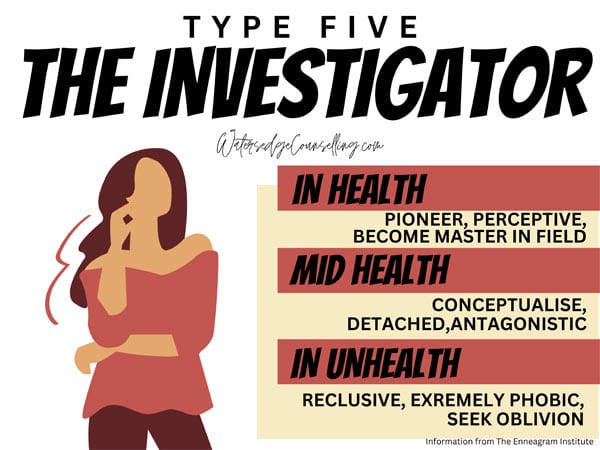
What does it look like to be the healthiest, happiest version of yourself? Chances are we all have different answers, but one thing we can agree on is that there is generally a scale of health that we all live on. Rather than swinging from extreme health to self destruction, life impacts us and over time we rise, fall or maintain in our health. Our level of self awareness equips us to take life giving steps so we can be healthier and happier.
Last week we began our Enneagram: Signs of health series. The Enneagram is an ancient personality theory that divides humans into nine different personality types. While every human is unique, researchers have found that people generally fit into nine different personality types, driven by their motivation, fear and immediate response.
In the past we have explored all nine personality types – the Heart Triad (Type 2: The Helper, Type 3: The Performer, Type 4: The Romantic), the Head Triad (Type 5: The Investigator, Type 6: The Loyalist, Type 7: The Adventurer) and the Gut Triad (Type 8: The Challenger, Type 9: the Peacemaker, Type 1: The Reformer). But what do each of these types look like when they are healthy, at a mid level (aka doing ok) and are unhealthy?
The Enneagram Institute deep dives into the characteristics of each personality Type and shares how our behaviour changes depending on our level of health. So we thought it was time to share some of these observations with you! Once you know your personality Type (Find it here), this series will equip you to become more self aware.
You can then take steps to take care of you, adjust and head towards health. If you identify characteristics in your mid-health section, this is a sign you need to adjust some things to head towards health. While you may be able to maintain here for awhile, it slopes towards unhealth and exacerbates self-sabotaging and harmful behaviours.
And if you know the Enneagram Type of a partner, a friend or a colleague, these tiers of health will give you language to better understand them, set boundaries, and give them the support they need. In some cases, this support must be entirely from outside sources and not from you, especially if the person is abusive, bullying or harming you.
Last week we started with the Heart Triad. Today we are continuing our series with the Head Triad – the types who cerebrally process everything before they act and are driven by understanding.
Type Five is the Investigator/ the Observer: people who are often introverted, curious, and who excel in areas they are passionate about. In health they are perceptive and pioneers in their field. You can tell they are struggling when they become detached and conceptualise everything. And if you see them acting extremely phobic and reclusive, they need additional supports.
Type Six is the Loyalist: People who are driven by a need for safety, relationship and reliability. In health, they are community builders, and are self affirming You can tell they are struggling when they look to authority for affirmation and become passive aggressive. And if you see them becoming fanatical, panicky or self-destructive, they need outside support.
Type 7 is the Adventurer/the Optimist: people who are excitable, energetic, and eager for new experiences. In health, they are accomplished, grateful and extroverted. You can tell they are struggling when they are continually restless and struggle with boundaries. In unhealth, they are impulsive and try to escape reality.



Check back next week for part three in our Enneagram signs of health series when we look at the Gut Triad: Types 8, 9 and 1. See all our Enneagram downloads here.
Do you want to learn more about The Enneagram? Would you like to better understand how to be the healthiest version of yourself? Here’s what you need to do: Contact Colleen on 0434 337 245, Duncan on 0434 331 243 for a FREE 10 minute consultation on how we can best help you or book online.